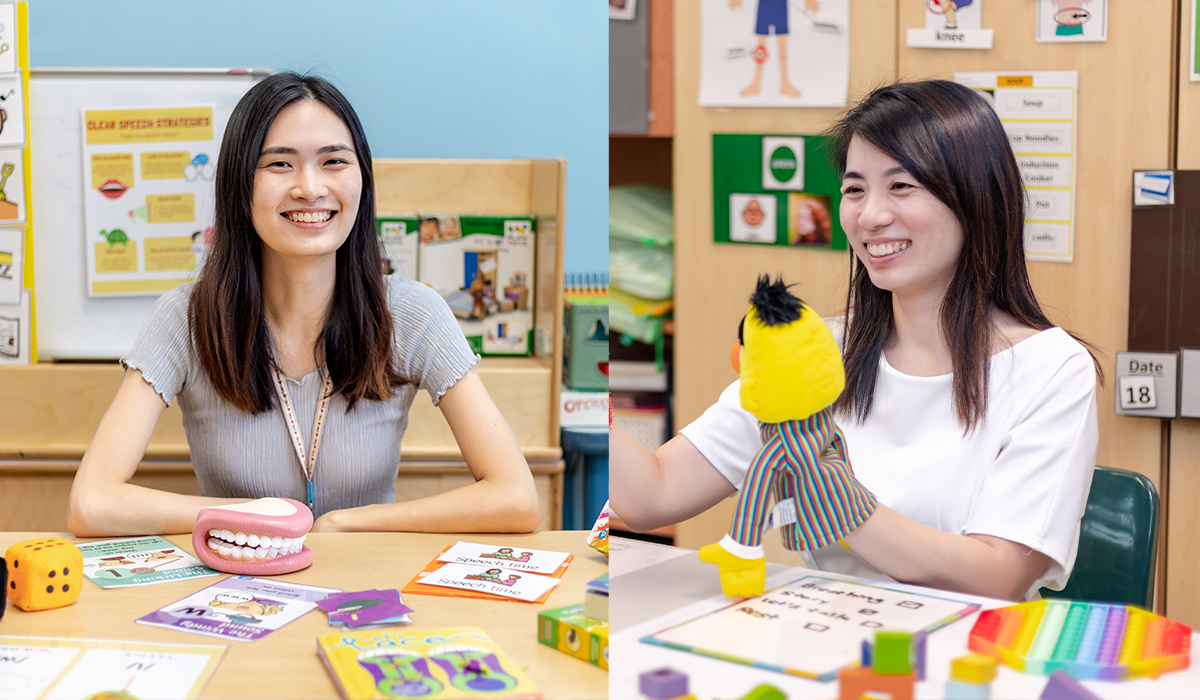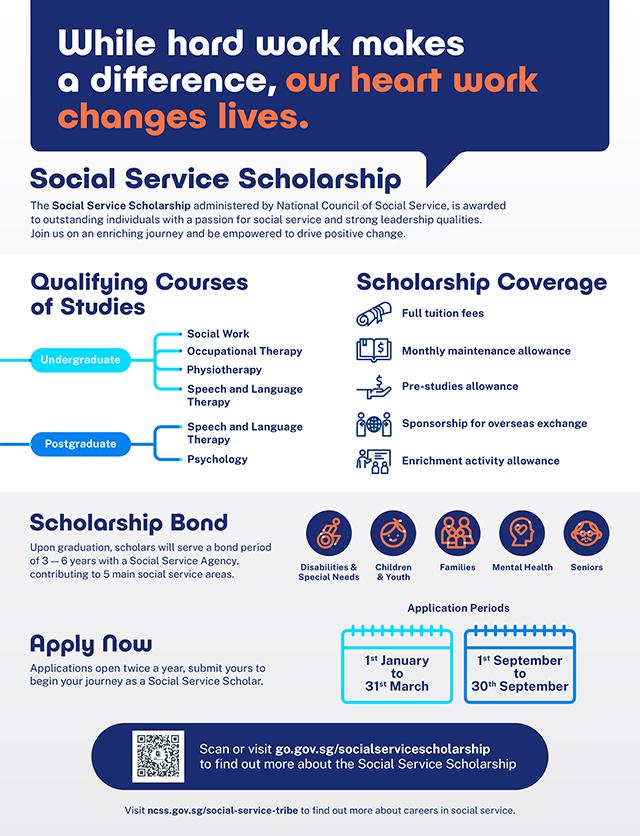Left: Jorine How is a Speech Language Therapist at Thye Hua Kwan Moral Charities' Early Intervention for Children (EIC) Services. She works closely with young children aged two to seven to address their communication and swallowing issues. She is a recipient of the Social Service Scholarship and graduated with a Bachelor of Speech Pathology (Honours) from the University of Queensland in Australia.
Right: Lim Xinyi is a Psychologist with Rainbow Centre, where she supports students with disabilities. She is a recipient of the Social Service Scholarship and graduated with a Master of Arts (Applied Psychology) (Educational Psychology) from the National Institute of Education.
Ever wondered what inspires one to pursue a career in the social service sector? For Lim Xinyi and Jorine How, the answer is simple: a passion for making a difference in people’s lives. They have both found their purpose in the social service sector where they work to support and empower those in need.
In Singapore, NCSS plays an important role in shaping and overseeing the social service sector, providing leadership and direction to over 500 social service agencies. Through NCSS’s Social Service Scholarship, Xinyi and Jorine have been able to pursue their dreams and impact the lives of others.
Xinyi currently works as a Psychologist at Rainbow Centre, where she works closely with students with disabilities ranging from the ages of 15 to 18. Her role involves providing services such as behaviour assessment, behaviour intervention and cognitive assessment for post-18 placements to help students gain independence and lead meaningful lives.
Jorine is a Speech Language Therapist at Thye Hua Kwan Moral Charities’ Early Intervention for Children (EIC) Services. Working closely with young children aged two to seven, she addresses their communication, speech, language and even picky eating difficulties, ensuring their holistic development and well-being.
We chatted with both Xinyi and Jorine to learn more about their passion for social service and the positive impact they are making in the lives of those they serve.
What sparked your interest in your respective fields?
Xinyi: I was with the NUS Community Service Club during my undergraduate days and had the chance to volunteer with the Bishan Home for the Intellectually Disabled. My interactions with the residents there led me to realise that they have so much potential which was untapped. This sparked my curiosity to learn more about them and how I can play a part in making their lives more fulfilling. This eventually inspired me to enter psychology.
Jorine: I have always wanted to pursue a career in allied health as I enjoy working with people. During my gap year, I decided that it was a good time to get to know more about what speech language therapy is about. I was very lucky to have the opportunity to volunteer at various speech language therapy departments in various settings, such as acute hospitals, outpatient clinics and Special Education (SPED) schools. After learning alongside and shadowing my fellow Speech Language Therapists, I started to envision myself working in this field. This in turn, inspired me to embark on my journey to becoming one.
Tell us more about the support you received through the Social Service Scholarship.
Xinyi: The scholarship provided financial help in terms of tuition fee coverage and a stipend, and hence, it afforded me the luxury to solely focus on my studies and coursework. Moreover, there were opportunities to connect with fellow scholars working in other organisations. It was always interesting to find out how others work differently.
Jorine: The support that I received through the scholarship included talks and seminars to understand more about the expectations of working as a Speech Language Therapist in the community. The scholarship also gave me a platform to connect with other allied health professionals like myself through gatherings, meetings and seminars. It also supported me financially as I could just focus as a student during my studies.
Could you share more about your day-to-day responsibilities?
Xinyi: I am currently supporting students with disabilities ranging from 15 to 18 years old. The students present with various neurodevelopmental disorders such as autism spectrum disorder, intellectual disability and attention deficit hyperactivity disorder. My role and responsibilities include providing services in the areas of behaviour assessment, behaviour intervention and psychological assessment for post-18 placements. I would need to work very closely with various stakeholders, for example, parents, teachers and therapists in the delivery of services to the students. Depending on the student’s needs, I might see the students one-on-one or in a group setting.
Jorine: My role as a Speech Language Therapist is to focus on improving the client’s communication, language, speech, feeding and work on picky eating. I work in a team with my fellow occupational therapists, social workers, and teachers. A typical workday would include going into classes to deliver group interventions with the teachers, having pull-out sessions where we have one-to-one sessions with the children to work on their speech in the speech room, and having meetings to discuss the client’s progress and goals with my team. I would also conduct trainings with the client’s parents and participate in goal-sharing with the client’s parents.
How have you been able to apply your university learnings to your current roles?
Xinyi: My graduate studies have equipped me with the necessary knowledge and practical skills to carry out my day-to-day work. During my course, I learnt how to conduct psychological assessments, conceptualise cases and implement behavioural interventions. And these are really the bread and butter of our work.
Jorine: I have been able to apply what I have learnt every day at work. As I work with my clients on a day-to-day basis, I continue to practice and use various therapy intervention methods. My university provided me with the fundamental knowledge while I continue to hone my skills in the working world through attending courses, seeking support from my mentors and interacting with the different professionals in my team.
What do you find most meaningful about your work?
Xinyi: What I find most meaningful about my work is the part I play in making the lives of others better. It is very rewarding when students overcome their challenging behaviours and as such, lead more fulfilling lives with their families and friends. The things we do have far reaching effects not just on our students but their families too.
Jorine: What I find most meaningful about my work would be getting to work and engage with the children. It is always a joy to celebrate their achievements, big or small, with the team and family. As we do set goals for the clients, it is always very rewarding when the children have achieved their goals or if they are improving towards them.
What advice would you give to students who are aspiring to pursue a career in your field?
Xinyi: The work of a psychologist might not be the easiest, but it will definitely be one that will bring about a deep sense of fulfilment, especially when you know you have helped put a smile on your client’s face. Having some interactions with this population of clients, probably through volunteering prior to entering the field, would be really helpful if you want to find out if this is a career for you. I would say to follow your heart and come onboard if you would also like to make a positive difference in the lives of others!
Jorine: I would say that it would be beneficial to have a job shadowing or volunteering experience first because it has benefitted me in considering speech language therapy as a career. Also, speech language therapy is truly a very interesting and vast field with plenty to learn. It will definitely be the start of a great adventure, you will get to work with clients, and it is truly rewarding to celebrate all the little milestones and successes with the clients, your team and the family.



